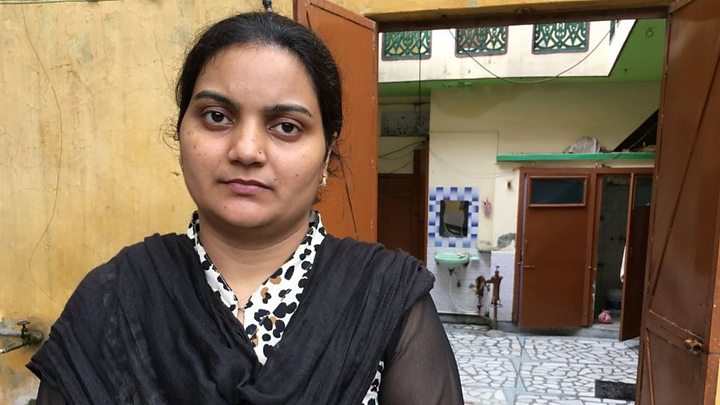India criminalises Muslim ‘instant divorce’
India’s parliament has approved a bill that makes the Muslim practice of “instant divorce” a criminal offence.
“Triple talaq”, as it’s known, allows a husband to divorce his wife by repeating the word “talaq” (divorce) three times in any form, including email or text message.
The Supreme Court declared the practice unconstitutional in 2017.
Supporters say the new measure protects Muslim women. Opponents say the punishment is harsh and open to misuse.
Men found in breach of the new law can be jailed for up to three years.
The bill was first tabled in 2017 but stalled in the upper house of parliament, where some MPs called it unfair.
India’s governing Bharatiya Janata Party (BJP) supports the bill, while the main opposition Congress party opposes it.
What is instant divorce?
There have been cases in which Muslim men in India have divorced their wives by issuing the so-called triple talaq by letter, telephone and, increasingly, by text message, WhatsApp and Skype. A number of these cases made their way to the courts as women contested the custom.
Triple talaq divorce has no mention in Sharia Islamic law or the Koran, even though the practice has existed for decades.
Islamic scholars say the Koran clearly spells out how to issue a divorce – it has to be spread over three months, allowing a couple time for reflection and reconciliation.
Most Islamic countries, including Egypt, the United Arab Emirates, Pakistan and Bangladesh, have banned triple talaq, but the custom continued in India, which does not have a uniform set of laws on marriage and divorce that apply to every citizen.
Why is the bill so controversial?
Campaigners and political parties are sharply divided over the bill.
The Congress party and others have questioned the need to criminalise triple talaq after the practice was already outlawed by the country’s top court. They accused the Hindu nationalist BJP of targeting Muslim families.
But law minister Ravi Shankar Prasad defended the bill, saying the practice had not stopped despite it being banned. He told the Rajya Sabha that some 574 cases were reported after the Supreme Court verdict.
“The judgement has come, but no action on triple talaq has been taken. That is why we have brought this law, because the law is a deterrence,” he said.
Campaigners say it’s almost impossible to quantify how many cases of triple talaq occur in India.
Source: Read Full Article




